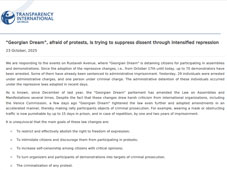
NGOs Condemn Mass Arrests of Protesters Under Georgia's Repressive Laws
By Liza Mchedlidze
Friday, October 24, 2025
Several Georgian civil society organizations have condemned what they describe as the Georgian Dream government's use of repressive laws to detain dozens of peaceful demonstrators in recent days.
According to the groups, roughly 70 people have been arrested in connection with recent anti-government protests, including about 30 detainees on October 22 alone. The arrests were made under recently adopted amendments backed by the ruling Georgian Dream party, which introduced harsher penalties for protest activity.
Under the new rules, blocking a road is punishable by up to 15 days of administrative detention. Repeat offenses can result in criminal prosecution and prison terms of up to one year.
In a joint statement, the NGOs said the legislation's primary purpose is to silence dissent and suppress public mobilization. They listed several key aims of the amendments: restricting the right to free expression, intimidating citizens, encouraging self-censorship, and criminalizing protest participation.
"The enforcement of these repressive laws and the arrests of demonstrators are carried out selectively," the statement reads. "Public figures, activists, and journalists are particularly targeted."
The groups said that arrests have often been made "in a demonstrative manner and with the use of force," which they believe is intended to create "fear and terror" among citizens and discourage participation in future rallies.
They also reported that police detained individuals who were standing peacefully on sidewalks, as well as people wearing medical masks for health reasons. "The persecution of masked citizens has taken on absurd forms," the organizations said.
Those detained include elderly citizens, mothers of young children, journalists, writers, actors, doctors, and civil activists.
The NGOs expressed particular concern that these cases are being heard by judges who have been sanctioned by several European Union member states. Among them are judges Zviad Tsekvava, Manuchar Tsatsua, Nino Enukidze, and Koba Chagunava.
"We emphasize once again that the only reason behind both these undemocratic laws and the way they are being enforced is the government's fear of the ongoing protests in Georgia," the statement concluded.

